The Flexible Fast Charger is good as a portable charging device for your BMW, connecting to 120-volt and even 240-volt. The real fast charger is provided by home stations like the BMW Wallbox and the more powerful models we’ll review here.
Best hardwired EV chargers for BMW
- Get a great dealJul 9, 2025 6:15 AM
Hardwired chargers such as JuiceBox or Siemens are more convenient than ever before, because it takes up less space on your floor or desk, won’t get unplugged accidentally.
If you live in the US, BMW will send you a home сharging Installation Kit to your address free of charge after purchasing your i4, i7 & iX online at their website. The out-of-pocket cost for home charging installation should be less than $500 , whereas most electricians would charge around $700 to install the same kind of charger.
Some Home Owners Associations (HOA) may not allow certain types of home EV Chargers to be installed, so please check with them before purchasing. If you do not have an outlet installed, or your HOA does not allow home EV Chargers to be installed, there are public charging stations located throughout the US. You can find the nearest charging station by using this website: https://www.plugshare.com/
Best plug-in EV chargers for BMW
- $37999Prime
eligibleJul 9, 2025 6:15 AM
We recommend plug-in chargers like Grizzl-E for those who have more than one electric vehicle because they can be used simultaneously and don’t require hardwiring. These types of chargers are less expensive up front but do have some drawbacks as well–you’ll need to remember to unplug them when not in use so they won’t overcharge your battery or overload your electrical system.

How to choose BMW-compatible home EV сhargers
The amperage of your home electric vehicle charger will need to be at least 16 amps, but most home сhargers can be found with 30 amps or more. For the BMW i3, i4, i7 and iX the optimal home сharger would be a Chargepoint 240-volt (50 amp) with weatherproof cover.
Where can I buy an electric vehicle charger?
You can buy home EV Chargers from many different places, but we recommend checking with your local electrician, Home Depot, or Amazon. Home Depot offers the Chargepoint 240-volt (50 amp) home сharger with free shipping. If you are an Amazon Prime member, you can get the same home charger shipped to your door in two days for free.
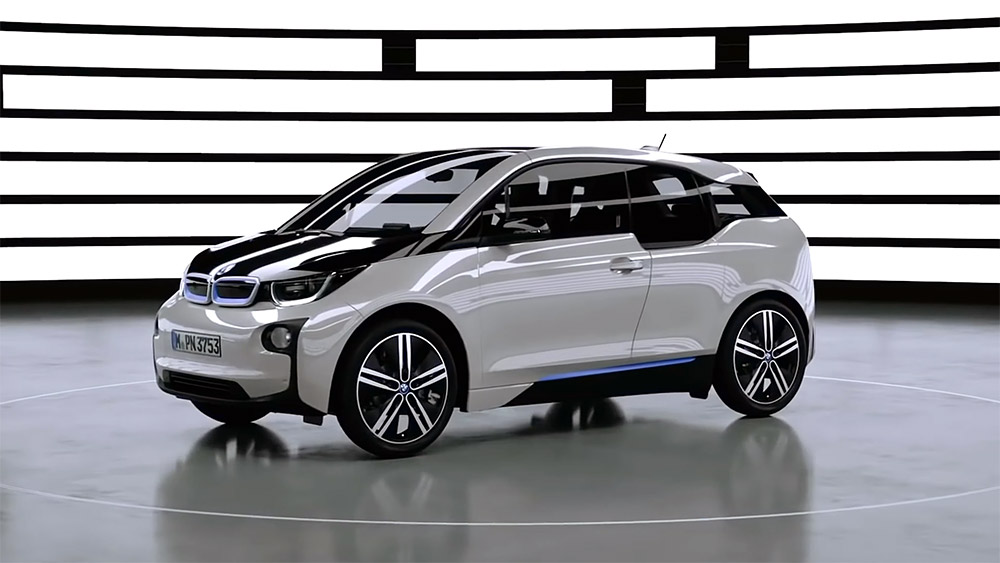
What’s the difference between Level 1, 2, & 3 chargers?
Level 1 charging uses a standard wall outlet (the same one used for your computer or television) and can take anywhere from 7-30 hours to charge your car depending on how much power your local utility company is supplying at any given time. A level 1 charger will cost around $200 but it will only give you enough charge for 50 miles of driving per day. This makes level 1 charging impractical for most people.
Level 2 chargers are much more common because they are installed in your garage and connect directly to your electric system. A level 2 charger can charge a BMW i4, i7 and iX from 0 to 100% in 7-8 hours, so it’s much quicker than the standard home Depot outlet which is why level 2 chargers have rapidly grown in popularity.
Level 3 chargers are the fastest and most expensive type of EV charger, and can charge a BMW i4 & iX models from 0 to 100% in as little as 30 minutes. Level 3 chargers are not commonly found outside of commercial settings such as airports or shopping malls.
What’s the difference between an EV Charger and a Tesla EV Charger?
An EV Charger is compatible with BMW electric vehicles that use the standard J1772 plug, while a Tesla EV Charger is only compatible with Tesla vehicles.
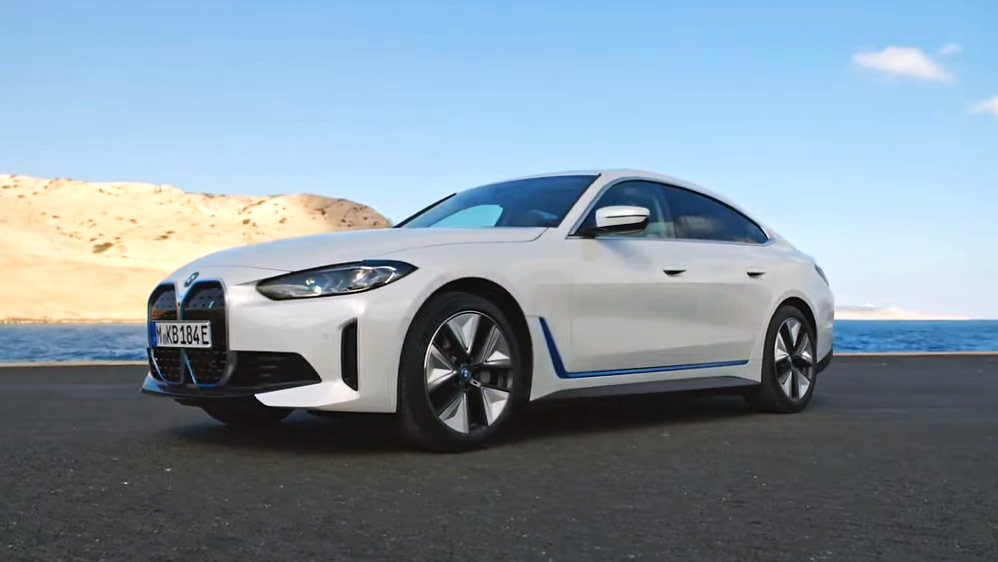
Can I install an EV Charger myself?
Yes, you can install an EV Charger yourself as long as you are comfortable with basic electrical wiring (via NEMA 14-50 or 6-50). EV adept offers a free installation service for all EV Chargers, and most professional electricians are also familiar with installing EVSE.
How do home EV Chargers work?
Home EV chargers work by plugging into a standard outlet in your home and then connecting to the BMW i4, i7 and iX. Once plugged in, the charger will automatically start charging your car. Home EV chargers are available in different amperages, so it’s important to choose one that is compatible with your BMW i4, iX and i7. Most home EV chargers have an amperage of 16 amps, which will work with most electric vehicles.
How Much Will it Cost to Install a Home EV Charger for i4 & i3 models?
Home EV chargers can be installed by either a professional service or by DIY enthusiasts. The cost of installation will vary depending on the type of charger you choose and the amount of work required. Home EV chargers typically range in price from $200 to $1,500.
Charging your BMW i4, iX and i3 at home is easy with a home EV Charger. Home EV chargers are available in different amperages, so make sure to choose one that is compatible with your car. Most home EV Chargers have an amperage of 16 amps, which will work with most electric vehicles.
Calculation of waiting time for charging to a full battery of a BMW i4, i3 and i7
| BMW i3BEV 120 Ah | BMW i4 eDrive40 | BMW iX xDrive50 | |
|---|---|---|---|
| 32 Amp EV charger | 4 h 06 min | 8 h 10 min | 11 h 15 min |
| 50 Amp EV charger | 2 h 53 min | 5 h 43 min | 7 h 52 min |
| 16 Amp EV charger | 8 h 19 min | 16 h 33 min | 22 h 48 min |
For public networks, the calculation can be done using a calculator.
We can assist you with installing EVSE for the i4, i7, iX.
For your house EV charger, we offer installation services for home chargers, which is a 240-volt Level 2 charging station. Installation includes standard electrical wiring and conduit, as well as all hardware needed for a successful installation. For more information or to schedule an appointment.
Charging modes
There are several different EV charging modes that allow drivers to choose the fastest charge time for their vehicle. Typically, this mode is used for short-term parking and is powered by a 22kW-EV charging station. However, there are also more powerful stations that can deliver higher charging currents. These stations are permanently connected to an AC power grid, integrate control and protection features, and typically have higher charging currents.
Listed below are charging times for the BWM i4 with the eDrive40 or M50 versions. The eDrive40 version charges quickly; the M50 version takes longer, with a 50-mile range. These times are approximate and will vary based on the temperature of the charging station and your vehicle. Listed rates also take into account the current state of your battery, which is important if you’re charging a BMW i4 quickly.
Chargers available
The BMW i4 has an impressive range, and the EV charging specs and guide show just how much you can expect to charge it in eight hours. If you want to charge it faster, you can use a DC fast-charging station. In as little as 10 minutes, the battery pack will have a 90-mile range boost! However, if you are looking for a more efficient charging option, you will have to choose a level two charger.
If you want to charge the BMW i4 at home, you can take advantage of a government grant that saves up to PS350 for a fully-installed charging point. The grant is conditional on a few conditions, though. You must have off-street parking and an OZEV-approved charge point. The public chargers will vary in cost, so you should shop around for the best deal.
Installation
When you’re able to use a 240-volt home charger, your BMW i4 will accept up to 11 kilowatts of power. This is enough power to fully charge the battery in less than eight hours. This is because European power delivery is based on three-phase wiring, which is more efficient than single-phase power flow in the U.S. Most home EV chargers will accept up to seven kilowatts of power, but that is still far less than the amount needed to charge an empty battery.
The guide also lists charging times for the eDrive40 and the M50 versions. The M50 has double the power but 50 miles less range. The charging times given are for a 20% to 80% charge, but this may be different depending on ambient temperature and energy load in the vehicle. Depending on the temperature, the charging rate may be slower. The EV charging times will vary depending on the model you own.
Comparison table – plug-in BMW iX, i7 & i4 EV chargers
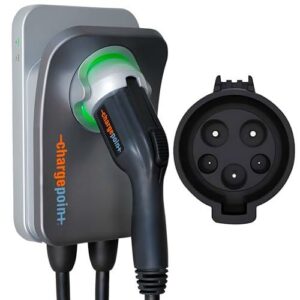 | 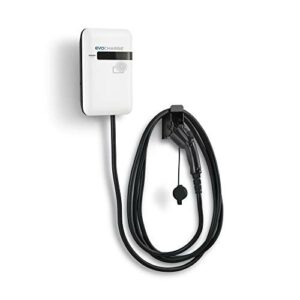 | 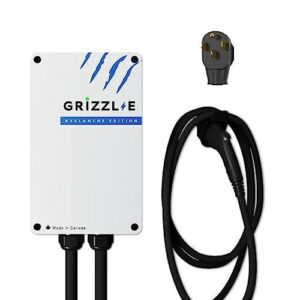 | 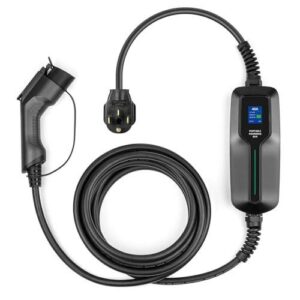 | 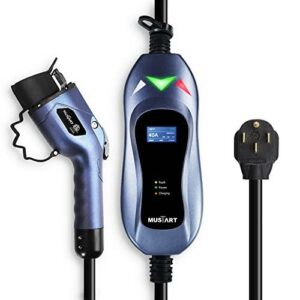 | |
| ChargePoint NEMA 6-50 plug Home Charging Station Level 2 (2... | EVoCharge Level 2 EV Charging station 7.7 kW (240 Volt, 25f... | Grizzl-E Level 2 EV Charger NEMA 14-50 Plug, 24ft Cable, In... | LEFANEV Level 2 Portable EV Charger NEMA 14-50 Plug, 9.6KW,... | MUSTART Level 2 Portable Electric Vehicle (EV) Charger (240... | |
| Overview | Charge Smarter, Not Just Faster. Safe and Reliable for Your Home and Your EV. Works with Any EV. Can be hardwired. | Fast charging and adjustable amperage. Heavy-duty EVSE which is suitable for any weather. UL Full Tested and Certified. | |||
| Brand | chargepoint | EVoCharge | Grizzl-E | LEFANEV | MUSTART |
| Amperage | 16, 24, 32, 40, 48, 50 | 32 | 16, 24, 32, 40 | 40 | 40 |
| Cable length, ft | 23 | 25 | 24 | 25 | 25 |
| Outdoor | Yes | Yes | Yes | Yes | Yes |
| Socket | NEMA 6-50 | NEMA 6-50 | NEMA 14-50 | NEMA 14-50 | NEMA 14-50 |
| Travel/Portable | No | No | No | Yes | Yes |
| Wall/Stand | Wall | Wall | Wall | ||
| Waterproof | Yes | n/a | Yes | Yes | Yes |
| Weight | 17.6 | 14.52 | 19.86 | 10.53 | 14.01 |
| Working temperature | -40°F to 122°F | n/a | -22°F to 122°F | -40°F to 158°F | n/a |
| Warranty | 3 years | 3 years | 3 years | n/a | 2 years |
| Certificate | UL certificate 20190607-E328478 issued 06/07/2019; Type 3R per UL 50E; ENERGY STAR qualified 06/25/19. | UL | UL Full Tested and Certified | n/a | n/a |
Comparison table – hardwired BMW EV chargers
 | 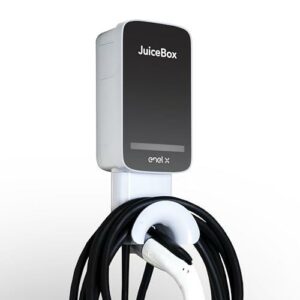 | 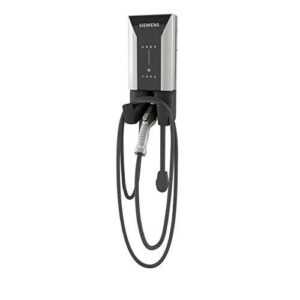 | 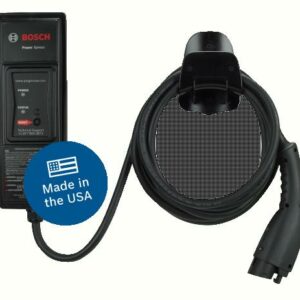 | 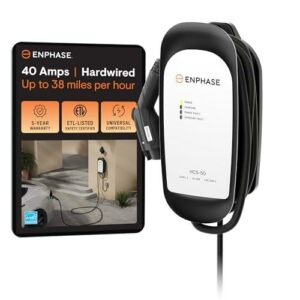 | |
| ChargePoint NEMA 14-50 plug/hardwired Home Charging Station... | JuiceBox 40 Hardwired Smart EV Home Charging Station (40 Am... | Siemens VersiCharge Level 2 Hardwired EV Home Charging stat... | Bosch Level 2 Hardwired EV Charging station (240 Volt, 18ft... | ClipperCreek Level 2 Hardwired Electric Vehicle (EV) Home C... | |
| Overview | Charge Smarter, Not Just Faster. The Flexibility to Work with Any Home. Works with Any EV. Hardwired connections are eligible up to 50 amps. | A hardwired connection that is perfect for those who want to be prepared for an EV future with more power. Professional Installation is required. The app and stable wifi make it easy to keep track of your charging. | A high-powered home device. Has high WiFi signal requirements. | The compact charger, despite its size, is not portable. Weatherproof design for any environment. | |
| Brand | chargepoint | JuiceBox | Siemens | Bosch | ClipperCreek |
| Amperage | 16, 24, 32, 40, 48, 50 | 40 | 12, 16, 24, 32, 40, 48 | 12, 16, 24, 32 | 40 |
| Cable length, ft | 23 | 25 | 20 | 18 | 25 |
| Outdoor | Yes | Yes | Yes | Yes | Yes |
| Wall/Stand | Wall | Wall | Wall | Wall | Wall |
| Waterproof | Yes | Yes | 1 | ||
| Weight | 17.6 | 21.2 | 17 | 14 | 14 |
| Working temperature | -40°F to 113°F | n/a | -40°F to +122°F | -22°F to 122°F | |
| Warranty | 3 years | 3 years | 3 years | 3 years | |
| Certificate | UL certificate 20190607-E328478 issued 06/07/2019; Type 3R per UL 50E; ENERGY STAR qualified 06/25/19. | UL & Energy Star | cUL listed | ENERGY STAR, ETL and cETL |
What’s New in BMW’s 2024 Lineup?
BMW’s heralding an electrifying change in their executive sedan lineup for 2024. Meet the all-new 5 Series (G60), which for the first time ever, introduces the i51 – a fully electric variant, redefining the mid-size sedan. Should you wish to view this groundbreaking vehicle, anticipate its arrival in BMW showrooms before the year draws to a close.
What’s Under the Hood of BMW i5?
Diving beneath the floorboards of the i5, you’ll find an impressive 84.3-kWh battery pack. This hefty power source promises to push the eDrive40 model for a whopping 295 miles before the need to recharge. If you fancy the dual-motor M60 model, you’re looking at an estimated range of 256 miles per charge. Although it may fall short of its eDrive40 counterpart, the M60 still offers a commendable range for an electric vehicle.
How Fast Can the i5’s Battery Pack Charge?
If the prospect of charging electric vehicles (EVs) intimidates you, worry no more. BMW’s i5 houses a battery pack designed for quick and easy replenishment. DC fast-charging stations allow you to charge from 10 to 80 percent in just half an hour. To sweeten the deal, BMW even includes three years of complimentary 30-minute charging sessions at Electrify America2 charging stations with every new i5 purchase.
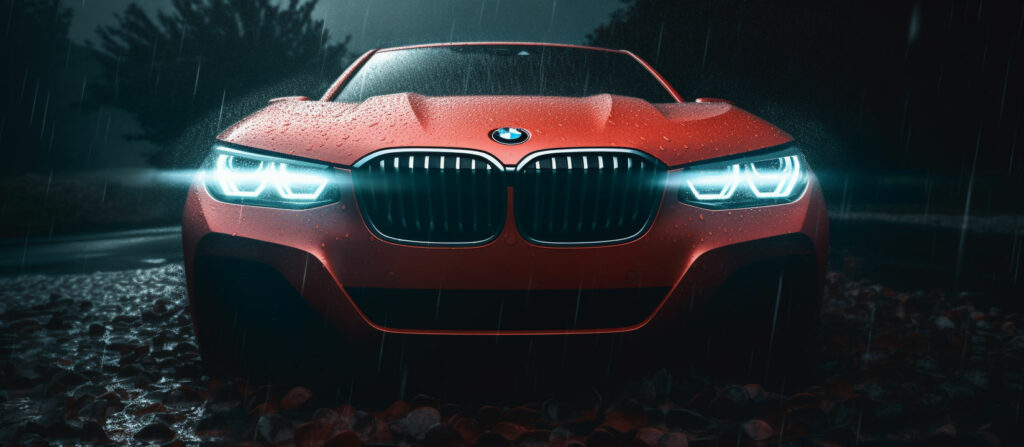
What Charging Equipment Comes With the BMW i5?
When it comes to charging, BMW doesn’t skimp on the essentials. All their electric and plug-in hybrid models are equipped with a standard charging cable approximately five meters in length, which conveniently fits conventional 3-pin sockets. For a more tech-savvy experience, EV chargers that connect through Wi-Fi will require a home broadband internet connection. Similarly, chargers with cellular connectivity can link to 4G mobile networks, much like your smartphone.
Can I Install My Own EV Charging Point?
Unless you are skilled in electrical work and experienced with installing EV chargers, it’s not recommended to tackle this task yourself. Instead, it’s best to leave it to a certified and experienced installer. According to the Department of Energy3, professional installation ensures that your charging station complies with local, state, and national codes and regulations, ensuring optimal performance and safety.
BMW’s new 5 Series (G60) is more than just a luxury sedan; it’s a leap forward into a greener and more sustainable future. As the world gradually transitions to electric vehicles, the BMW i5 stands as a testament to the Bavarian automaker’s commitment to innovation and sustainable mobility.
Can You Use Tesla Chargers for BMW’s Electric Vehicles?
Absolutely! BMW electric vehicle owners have the option to utilize Tesla chargers4. However, keep in mind that an adapter is required for compatibility. While it’s possible to charge your non-Tesla electric vehicle at a Tesla charging station, certain limitations may apply, and purchasing an adapter is a necessary step.
What Adapter Can You Use for Non-Tesla EVs?
To access low-powered Tesla chargers, non-Tesla electric vehicles need a J1772 adapter. This simple yet crucial tool ensures compatibility with both the Tesla Wall Connector and Tesla Mobile Connector. With this adapter, charging your BMW at a Tesla station becomes a breeze.
Can You Charge a BMW i3 with a Tesla Wall Connector?
Yes, but only with the appropriate adapter, such as the Tesla Tap. This handy device connects to a Tesla wall or mobile connector, allowing vehicles with J1772 connectors, like the BMW i3, to plug in. So if you’re an i3 owner eyeing a Tesla wall connector, make sure to equip yourself with a Tesla Tap.
What Other Charging Options are Available for the BMW i3?
Charging your BMW i3 isn’t confined to Tesla adapters and wall connectors. Using a Type 2 connector, you can charge at home, work, or public charging points. Additionally, a CCS connector is available for rapid charging. This flexibility provides ample options to ensure your i3 is always ready to go.
Is it Safe to Charge a Removed EV Battery Inside the House?
Safety comes first. Hence, it’s crucial to avoid charging a battery inside the house if it has been removed from the BMW EV. Faulty batteries or chargers can potentially lead to dangerous situations, including explosions or fires. Always adhere to manufacturer’s guidelines when it comes to EV battery charging and maintenance.
What are the Different Home Charging Options for BMW?
Charging your electric car at home comes with various options. These include standard 120-volt home outlets (Level 1), 208-240V outlets similar to those used by dryers (Level 2), or dedicated 480V+ public fast chargers (DC Fast Charging). Charging times will vary depending on the option chosen and the size of the battery.
What Connector Does the BMW i3 Use for Fast Charging?
For those in a hurry, the BMW i3 employs a CCS DC connector, which is one of the most widely used DC chargers globally. This high-speed charger can energize your i3 at a rate of up to 49 kW, allowing for swift and efficient recharging.
Charging your BMW electric vehicle, such as the new i5 or the i3, is a flexible process with numerous options. Whether you’re using a Tesla charger with an adapter, a Type 2 or CCS connector, or even home outlets, BMW ensures you have the tools you need for a smooth and efficient charging experience. Always remember to prioritize safety and follow manufacturer guidelines when handling and charging EV batteries.
Should You Charge Your EV Battery to 100% Capacity Every Night?
Contrary to what one might think, charging your EV battery to full capacity every night isn’t the best practice. Frequent charging cycles can lead to battery degradation, shortening its lifespan over time. Generally, most EVs on the market, including the BMW i5 and i3, offer a range of a few hundred miles on a single full charge. This range should be sufficient for several days unless extensive daily driving is part of your routine.
What is the Charging Rate of BMW i3 Models?
It’s important to note that some BMW i3 models come equipped with a single onboard charger, limiting them to a charging rate of 15 amps or 3.3 kW, instead of the higher 6.6 kW. This means that regardless of the Electric Vehicle Supply Equipment (EVSE) you connect, 3.3 kW is the maximum charging rate these models can achieve.
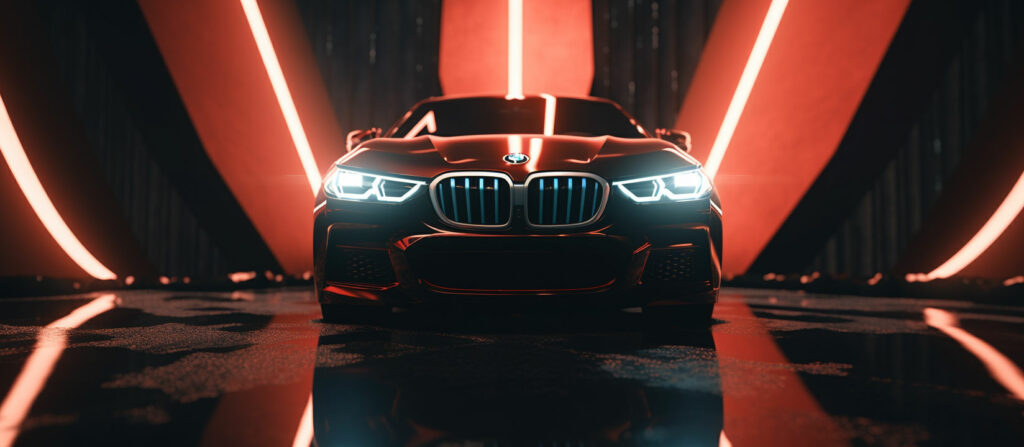
How Quickly Can Level 3 DC Fast Chargers Recharge the i3 Battery?
In the world of EV charging, speed is a prized asset. Level 3 DC fast chargers can recharge the i3 battery up to 80% in a mere 20 minutes. However, to protect the battery from overcharging, charging speed slows down once the battery reaches 80% capacity. Quick and protective, these fast chargers offer the best of both worlds.
What Connector is Used for Level 3 DC Fast Charging?
When it comes to Level 3 DC fast charging, the CCS Combo connector holds the standard. In the current BMW i3, a depleted battery takes approximately 40 minutes to recharge to about 80% of its 153-mile capacity using this connector. So, if you’re in a hurry, a CCS Combo connector and a Level 3 DC fast charger can get you back on the road in no time.
What are the Specifications of the BMW i3 Battery Pack?
Let’s delve into the BMW i3 battery pack specifications. The i3 boasts a 42 kWh battery with a capacity of 120Ah and a voltage of 352V. This powerful battery is designed to offer optimal performance, ensuring a smooth and reliable driving experience.
How Long Do BMW i3 Batteries Last?
The lifespan of BMW i3 batteries typically ranges between 3 to 5 years, although this can vary depending on driving habits, weather conditions, battery type, and more. To prolong the life of your i3 battery, consider storing your vehicle indoors, away from extreme temperature or climate fluctuations. Proper battery care can significantly extend its lifespan, offering you many years of enjoyable electric driving.
Maintaining an electric vehicle, like the BMW i3 or i5, involves understanding its charging and battery care requirements. By adhering to best practices, you can ensure optimal battery performance and lifespan, making the most of your BMW EV driving experience.
Is Charging Your Electric Car Safe in Inclement Weather?
If you’re worried about charging your electric car during a rainstorm or in other challenging weather conditions, you can breathe a sigh of relief. Charging connectors are designed to be waterproof, making it safe to charge in various weather conditions. However, for convenience and safety, it’s recommended to unplug your vehicle during the charging process. With this safety measure in place, you can charge your BMW i3 or i5 anytime, rain or shine.
What’s the Optimal Charging Level to Maintain a Healthy Lithium Battery?
Keeping your electric vehicle’s lithium battery healthy requires a specific charge level. Experts recommend keeping the battery’s charge between 20% and 80%. Regularly charging the i3 or i5 to 100% can generate excess heat and stress, which can negatively impact the battery infrastructure in the car. By maintaining an optimal charge level, you can ensure your battery’s longevity and performance.
Can You Upgrade the BMW i3 Battery?
Yes, it’s possible to upgrade the BMW i3 battery. While it’s not a do-it-yourself (DIY) task due to its complexity, the process is generally more manageable than most people might anticipate. For instance, if your i3 has a 60 Ah unit, upgrading to a 120 Ah unit could effectively double your electric-only range, particularly if you have the REx version of the vehicle.
How Much Does a BMW i3 Battery Replacement Cost?
The cost of a BMW i3 Battery Replacement can vary, but on average, you should anticipate spending between $290 and $316. This cost estimate breaks down into labor costs, estimated between $99 and $125, and parts priced at approximately $191. Keep in mind these are averages, and actual costs can fluctuate based on various factors, including location and service provider.
Is it Safe to Wash Your Electric Vehicle While It’s Charging?
Washing your electric vehicle while it’s charging is indeed safe. The charging connectors on your BMW i3 or i5 are designed to be waterproof, ensuring you can keep your car clean without worrying about water damage. However, it’s generally more convenient and safer to unplug the vehicle during the wash. Avoid directing high-pressure water directly at the charging port, and you can enjoy a spotless, shiny EV without any concerns.
Owning an electric vehicle like the BMW i3 or i5 comes with its unique set of considerations. From safe charging practices in inclement weather to maintaining optimal battery health and understanding battery replacement or upgrade procedures, it’s essential to stay informed. With these tips and guidelines in mind, you can ensure a seamless, enjoyable, and long-lasting electric driving experience.
What are the IP Ratings for Level 2 EV Chargers?
It’s essential to understand that standard IP ratings for Level 2 EV chargers, which operate at 7.4 kW, typically fall between IP54 and IP55. IP ratings provide a standardized measure of the degree of protection against dust, dirt, and water that an electrical device offers. Ratings of 8 are generally assigned to devices capable of prolonged submersion in water, but this level of protection isn’t necessary for home EV chargers. Therefore, when selecting a charger for your BMW i5 or i3, you can be assured that its IP rating is suitable for typical home use.
Where Should You Install Your EV Charging Station?
When it comes to installing your EV charging station, most EV industry experts and manufacturers recommend indoor installation whenever possible. This practice ensures the device’s longevity and optimal performance. But if you don’t have enough space in your garage to charge your BMW electric vehicle, you can still install the charger indoors and extend the cord to your vehicle outside. This arrangement provides flexibility while protecting the charger from elements.
What is BMW’s Electric Vehicle Strategy?
In 2021, BMW began a strategic refocus on its core customers, aiming to make 50% of all BMW sales electric vehicles by 2030. In January 2022, they announced the discontinuation of the i3’s production, shifting their focus towards larger and longer-range electric options like the i4 and iX. These new models share the design language of the brand’s other models, reaffirming BMW’s commitment to a future of electrified mobility.
What Sets the BMW i3’s Construction Apart?
The BMW i3’s construction features a carbon monocoque, an advanced structural design used in the i8 supercar. The monocoque design was a significant investment for BMW and stood out as a distinguishing feature in the EV market. In its early iterations, the i3 also featured a range extender engine to supplement the battery. However, BMW discontinued this feature after 2018 in favor of a larger battery with a capacity of 33.2 kWh, later increased to 42.2 kWh.
What is the Top Speed of the BMW i3?
The top speed of the BMW i3 is electronically limited to 93 mph for efficiency. However, thanks to its seamless acceleration, the i3 is well-equipped to keep up with fast motorway traffic. It’s worth mentioning that the range extender engine, when it was an option, added 120 kg to the i3’s weight and slightly wider rear wheels, affecting the straight-line performance slightly. However, the current i3, without the range extender, boasts an impressive balance of efficiency and speed.
What is the Real-World Range of the BMW i3?
The BMW i3 is equipped with a usable battery capacity of 37.9 kWh, allowing for a range of approximately 145 miles on a full charge. However, actual range can fluctuate based on several factors, including climate conditions, terrain, use of climate control systems, and driving style. It’s crucial to consider these factors to optimize the battery range and efficiency of your i3.
Why Choose the BMW i3 for an All-Electric Driving Experience?
As we look towards a future less dependent on fossil fuels, models like the BMW i3 offer an all-elective driving experience that reduces reliance on gasoline. This not only contributes to sustainability efforts but also eliminates concerns over fluctuating fuel costs, offering owners more predictability in their transportation expenses.
How Does the BMW i3’s Battery and Charging System Work?
The BMW i3 is outfitted with a battery that boasts a total capacity of 33.2 kWh, with 27.2 kWh of that being usable. This capacity translates into a practical range of approximately 100 miles on a full charge. Again, it’s vital to note that factors like climate, terrain, and driving style can influence this range.
How Long Can the BMW i3 Stay Idle Before the Battery Dies?
If you’re wondering about your BMW i3’s endurance when it’s not being driven, you’ll be pleased to learn that it can typically sit idle for about four weeks to two months before the battery’s charge depletes. This feature gives owners greater flexibility and peace of mind, especially during periods of infrequent use.
Can You Replace a BMW i3 Battery Yourself?
Many people ponder whether BMW battery replacement requires professional assistance or if it’s a feasible do-it-yourself (DIY) task. The good news is, you can indeed handle the battery replacement on your own. However, always ensure you follow manufacturer guidelines and safety precautions during the process.
What Was the Original Range Goal for the BMW i3?
During the development of the BMW i3, the target was to achieve a range of 100 miles, mirroring the projected range of the BMW ActiveE. However, to reduce the vehicle’s weight and optimize efficiency, the battery capacity was scaled down to 16 kWh, rather than the 30 kWh found in the ActiveE.
What is the BMW LIM Module?
The BMW LIM module, or Charging Interface Module, is a critical component in the i3’s charging system. It supports various charging standards, including CCS, CHAdeMO, and AC charging. This module facilitates communication between the vehicle and public charging infrastructure, enabling rapid charging capabilities and contributing to the overall practicality and convenience of owning a BMW i3.
Does my BMW come with an EV charger?
For the U.S. market, every new EV purchased from BMW comes with a Flexible Fast Charger, which plugs into 120/240-volt, but still can’t provide fast speed like the Wall Box and top-of-the-line models described here.
What’s the best BMW charger for fast charging at home?
If you’re happy with the price and speed, the BMW Wall Box is optimal. There are also more powerful top models, which we compared in our review.
How far i can drive on one charge with the iX xDrive50?
The BMW iX xDrive50 has a range on one battery charge up to 324 miles.
How far can the BMW iX M60 travel on a single charge?
The BMW iX M60 has a range of up to 288 miles on one battery charge.
How far i can drive on one charge with the i4 eDrive40?
The BMW i4 eDrive40 has a range on one battery charge up to 301 miles.
How far i can go on single charge with the i4 M50?
The i4 M50 has a range of up to 270 miles on a single charge.
Contents
- 1 Best hardwired EV chargers for BMW
- 2 Best plug-in EV chargers for BMW
- 3 How to choose BMW-compatible home EV сhargers
- 4 Where can I buy an electric vehicle charger?
- 5 What’s the difference between Level 1, 2, & 3 chargers?
- 6 What’s the difference between an EV Charger and a Tesla EV Charger?
- 7 Can I install an EV Charger myself?
- 8 How do home EV Chargers work?
- 9 How Much Will it Cost to Install a Home EV Charger for i4 & i3 models?
- 10 Calculation of waiting time for charging to a full battery of a BMW i4, i3 and i7
- 11 We can assist you with installing EVSE for the i4, i7, iX.
- 12 Charging modes
- 13 Chargers available
- 14 Installation
- 15 Comparison table – plug-in BMW iX, i7 & i4 EV chargers
- 16 Comparison table – hardwired BMW EV chargers
- 17 What’s New in BMW’s 2024 Lineup?
- 18 What’s Under the Hood of BMW i5?
- 19 How Fast Can the i5’s Battery Pack Charge?
- 20 What Charging Equipment Comes With the BMW i5?
- 21 Can I Install My Own EV Charging Point?
- 22 Can You Use Tesla Chargers for BMW’s Electric Vehicles?
- 23 What Adapter Can You Use for Non-Tesla EVs?
- 24 Can You Charge a BMW i3 with a Tesla Wall Connector?
- 25 What Other Charging Options are Available for the BMW i3?
- 26 Is it Safe to Charge a Removed EV Battery Inside the House?
- 27 What are the Different Home Charging Options for BMW?
- 28 What Connector Does the BMW i3 Use for Fast Charging?
- 29 Should You Charge Your EV Battery to 100% Capacity Every Night?
- 30 What is the Charging Rate of BMW i3 Models?
- 31 How Quickly Can Level 3 DC Fast Chargers Recharge the i3 Battery?
- 32 What Connector is Used for Level 3 DC Fast Charging?
- 33 What are the Specifications of the BMW i3 Battery Pack?
- 34 How Long Do BMW i3 Batteries Last?
- 35 Is Charging Your Electric Car Safe in Inclement Weather?
- 36 What’s the Optimal Charging Level to Maintain a Healthy Lithium Battery?
- 37 Can You Upgrade the BMW i3 Battery?
- 38 How Much Does a BMW i3 Battery Replacement Cost?
- 39 Is it Safe to Wash Your Electric Vehicle While It’s Charging?
- 40 What are the IP Ratings for Level 2 EV Chargers?
- 41 Where Should You Install Your EV Charging Station?
- 42 What is BMW’s Electric Vehicle Strategy?
- 43 What Sets the BMW i3’s Construction Apart?
- 44 What is the Top Speed of the BMW i3?
- 45 What is the Real-World Range of the BMW i3?
- 46 Why Choose the BMW i3 for an All-Electric Driving Experience?
- 47 How Does the BMW i3’s Battery and Charging System Work?
- 48 How Long Can the BMW i3 Stay Idle Before the Battery Dies?
- 49 Can You Replace a BMW i3 Battery Yourself?
- 50 What Was the Original Range Goal for the BMW i3?
- 51 What is the BMW LIM Module?

i3 connected to a 40 amp charger, settings: 1:00 am to 7:00 am. The electric car has been plugged in until 10:00pm.
When I checked the i3 at 7:15 am the next day, the car was not charging. When I opened the driver’s side door, it started charging. This has happened several times now. What is the problem?
Most likely your car has a faulty charger, you need to take your car to the dealer.
i put my i3 on charge and i waited 12 hours to charge from half battery to full battery. am i doing something wrong?
If you use a standard socket it takes less time to charge the battery from a low battery charge to 80% than it does to charge from 80% to 100%. Therefore, if you charge the battery to 100%, it will take longer. Especially if you are using low amperage. Choose Level 2 alternative chargers for your BMW and you will speed up the process considerably.
I noticed that the i3 charging time is not synchronized with the i3 Remote app and after rebooting the values change, has anyone had this happen?
The app indicates when the last update was, so if it’s not close to the current time, that’s one reason why it’s different when you look at the data in the electric car.
as soon as i plug in the cable, my bimmer immediately starts charging, although i have enabled delayed charging. what’s wrong ?
If the EV thinks it won’t be at 100% by the time you leave, then it starts charging right away.
Unfortunately, if the BMW i3 thinks it won’t have time to charge, the car starts charging immediately.
Does the charging station come with every car or does it need to be purchased additionally?
Can I charge my BMW with a regular wall charger?
A 110V charger comes with the car and will charge the i3 overnight if you have a 20A 120V circuit available. You can purchase a 220V battery charger for the beamer which charges faster.
Is there an option to automatically stop charging at 80% in the BMW i3?
In the BMW i3 there is no possibility to automatically stop charging, charging up to 100% is normal.
Is there any way to see what the current charging rate is in the i3?
You can’t see the current charging rate of the car, you have to calculate it yourself. Try the BMW charging time calculator.
Does anyone know what the actual charging rate of a BMW is in kW or amps? I know that the car charges at most 32 amps. What about the different chargers?
The power will depend on the charger and the outlet.
The lowest power is 6A. And limits are introduced by manufacturers up to 7kW to reduce the problem of overheating.
Put the i3 on charge with about 75% charge the indicator on the dashboard says charging will be complete in about 4 days. It actually charges in a few hours. How can I get a correct prediction of the wait time?
If your car is under BMW warranty, return it to the service for diagnosis.
After setting the timer to off-peak time with the app, a day later the time changed by itself.
Try deleting your profile in the BMW charging app and relying on the on-board computer in the BMW i3 to control charging time.
How long does it take to charge the i3 from the 3-pin connector?
At maximum battery discharge, the electric car is charged for 13 hours from the 3-pin connector.
I would only like to charge to 80% to take care of the battery. How do I set the charging limit to 80% on my BMW?
You can’t limit the charge to 80%. Mike Becker wrote about this in his blog.
It is best to charge the vehicle to 100% so that the battery cells are balanced.
This morning when I thought my i3 was fully charged, I had the same charge level as yesterday and my charger was flashing red.
What to do?
I had a similar situation, try unplugging and plugging in your charger. Or give it back under warranty. Hardwired EV stations are more stable than OEM chargers.
Does anyone know if the BMW iX supports bi-directional charging?
The BMW iX does not support bi-directional charging.
I can’t find a clear answer about how much amperage does the charger that comes with the BMW iX car require?
For USA: Single-phase maximum 7.4kW = 32A / 230V.
3 Phase max. 11kW = 16A per phase / 230V
How do I leave an electric car parked for long periods of time? How long will it take a fully charged i4 standing still to run out of power?
It all depends on the weather conditions, even at 0 degrees your BMW in the worst case will discharge 5% in a week.
Will I be able to charge my i4 with a high-speed charger?
Is that the second charging port with two pins?
If you have such a port (CCS1) as you say, then you can charge your BMW i4 with a high-speed charger.
Can anyone provide the correct specification for a 32 amp charging cable for the i7, please?
If your question is about the European standard, then BMW’s 7kW blue “python” cable – is what you need and it will fit. The charger cable should be 2 types on both ends of the charger. If you are looking for a U.S. charger, the current review above just discusses the right models of BMW home chargers.
Does using DC fast charging harm the battery over time and can I increase the speed of my home Level-1 charger?
You must make sure that the power outlet can handle the load by applying a higher-powered charger device to your Bimmer EV.
Constant current does not significantly degrade the battery if it is used sporadically. Better consider installing a NEMA 14-50 receptacle and Level-2 charger.
Is there any way to interrupt the pre-conditioning cycle after a night time charge?
And is there a way to automate this with a smartphone?
Set the departure time for 1 day a week in the late morning and set the charging range. This method will work.
Great post! Helped me understand more about EV charging for my i3. Had no idea about the usable battery capacity.
Interesting to learn that the i3 can sit idle for weeks without battery drain. That’s some high-quality EVSE!
Wow, the charging capacity of the i3 is pretty impressive. Way to go, BMW EV technology!
I’m impressed with the range of BMW i3. It’s perfect for my daily commute without constant charging worries.
Always wondered about electric vehicle battery replacement. Cool to know it’s a DIY task. Cheers!
I’m thinking to switch to electric vehicles, this post is a great push. BMW i3 seems like a solid choice.
Yo! Dat BMW LIM Module be the real MVP. Fast charging all day, everyday! EV charging tech on fleek!
great blog post, didn’t know EVs like BMW i3 had such good range, guess i need to start considering one
i3 seems quite practical with efficient charging systems, especially for city drives. Considering to get one now.
Didn’t know about the EVSE before. Sounds like a cool system for efficient charging!
Excellent stuff about lithium battery usage in EVs. More power to green tech!
I’ve been considering electric vehicles, this post makes the BMW i3 quite tempting!
Is the battery replacement cost for the BMW i3 in line with other EVs?
Man, I wish there were more public charging stations in my area. It would make owning an i3 so much easier.
I think I just fell in love with the BMW i3, gotta say, the battery tech sounds impressive!
OMG! BMW aiming for 50% EV sales by 2030 is insane! That’s some serious EV transition goals.
i thought charging ev in the rain was a no-no turns out it’s safe thanks for the info
just bought a second-hand BMW i3, good to know about the battery replacement process, you da real MVP!
LOL, that’s some awesome tech behind the BMW i3. Makes me wanna ditch my old gas guzzler.
Didnt knw evs cld sit idle fr so long without battery draining. Good stuff on electric vehicle battery life!
I’ve been using the BMW Wallbox Essential for my i4 for a few months now. The 25-foot cable is a lifesaver, especially when I park a bit far from my garage outlet. Charging is smooth and consistent. Anyone else using this?
I’ve got the same setup for my iX3. Totally agree about the cable length. It’s been a game-changer during those snowy Canadian winters when I can’t park close to the garage.
Has anyone tried the ChargePoint NEMA 14-50 with a BMW? I’m curious about the WiFi feature and how useful it really is.
I use it for my BMW i3. The WiFi feature lets you track your charging stats and even set schedules. It’s been pretty handy for me, especially when I want to take advantage of off-peak electricity rates.